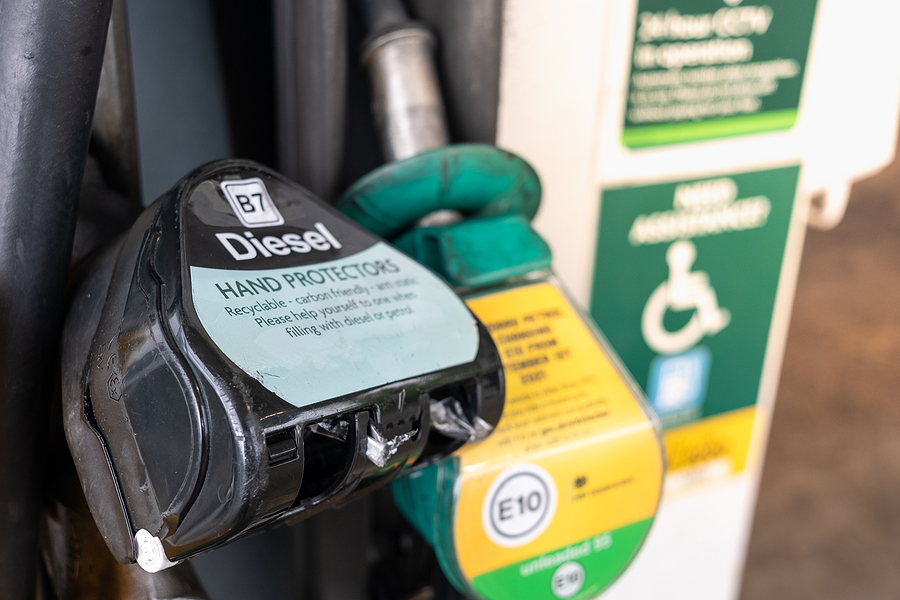Gas prices; am I right? Good thing we don’t live in Oregon, where gasoline prices have skyrocketed to a breath-taking $9 per gallon. But still, the price for fuel right now is astronomical, so it is no surprise that so many drivers are looking for alternatives to spending their paychecks on their gas tanks. Aside from better car care and driving habits, there really isn’t much we can do to avoid paying for the fuel we need. This realization has often inspired drivers to explore the benefits of switching to diesel fuel.
But can you put diesel in a car that takes unleaded gasoline? If so, will it improve fuel functionality? If not, what would happen if you did anyway? Continue below to learn the difference between gasoline and diesel, plus whether you can use them interchangeably in vehicles.

Using Diesel in Lieu of Gasoline is Probably Not Possible
How old is your vehicle? Was it manufactured within the last twenty-five years or so? If yes, then a diesel fuel nozzle won’t even fit inside of your gas tank opening. Diesel fuel nozzles are differently-sized compared to standard unleaded gasoline nozzles at the local gas station, plus there is a special plate fitted under the gas cap on designated unleaded vehicles, making the insertion impossible. Sure, you could use your own fuel container and nozzle, or maybe your car’s older than twenty-five years old and without the hidden gas cap plate. Motorcycles don’t have the hidden gas plate either. But that’s not the end of the story. There are more reasons why you can’t put diesel into a vehicle that takes unleaded gasoline.
The Difference Between Diesel and Gasoline
So, what would happen if you put diesel fuel into a car that uses standard unleaded gasoline? To better understand what would happen and why, let’s explore the differences between diesel and gasoline. Compared to unleaded gasoline, diesel fuel is heavier. One gallon of diesel is a pound heavier than one gallon of gasoline.
Diesel fuel is also oily, and science tells us that oil doesn’t evaporate in the normal sense. The same can be said about diesel. Furthermore, diesel smells completely different than unleaded gasoline. So, when taking into consideration all of these differences, you can rationally come to the conclusion that nothing good would come of you swapping out your unleaded gasoline with diesel. In fact, you can expect your car to not start.
Why You Unleaded Gas Car Won’t Start if You Give it Diesel Fuel
You see, cars that are designed to use unleaded gasoline are equipped with a fuel injection system that uses fuel injectors to shoot gasoline into the cylinders of the engine. Once there, the fuel is ignited by the spark plugs, which then turns the engine over. But if you were to use diesel fuel in place of gasoline, the fuel injectors would transport the diesel into the engine cylinders, the spark plugs won’t be able to ignite the fuel. So, your car won’t start. Now, will it do any damage to your vehicle? That’s a whole other topic.
Will Diesel Damage an Unleaded Gas Engine?
Well, we know that an unleaded gasoline vehicle will not start if you give it diesel fuel, but we haven’t talked about whether it does any damage or not. Well, thankfully, no, there shouldn’t be any damage to your engine or any other system within the vehicle if you put diesel fuel in your unleaded gas engine car. However, you will need to drain the fuel tank and refill it with the proper fuel. This can be a really tedious process and should only be done if you are familiar with routine automotive work like oil changes and filter replacements. Otherwise, take your car into a local Indianapolis automotive repair shop for license car maintenance and repair services.
Does your car or truck need some fuel filter or fluid change service? Contact Northeast Auto Service at 317-475-1846 for professional car maintenance in Indianapolis, Indiana at a price you can afford. We work on all make and model vehicles, providing everything from oil changes to major engine work.
Related Posts:
What is a Fuel Conditioner and Should I Use One?
Frequently Asked Questions About Gas Caps
State and Federal Regulations for Private Storage of Diesel Fuel
